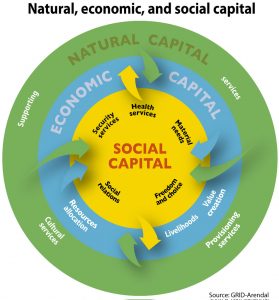One of the leading Transition Towns is Frome – and it’s been doing some marvellous things:
Compassionate Frome
Flatpack Democracy 2.0 – Frome makes politics relevant & fun
.
Here’s a piece in the news today, looking at ‘social capital’:
.
How a small British town used social connections to make residents happier and healthier
For a long time, Helen Kingston had noticed that a lot of her patients seemed dejected. A general practitioner in Frome, a charming English village two-and-a-half hours southwest of London, she had plenty of patients who were understandably worn down by multiple illnesses, who came in up to 80 times a year and needed more than a doctor could offer in a 10-minute appointment. But there were also many who felt helpless in ways that were harder to define…
Kingston applied for and received £110,000 ($142,000) of “innovation” funding from the Clinical Commissioning Group (CCG), an offshoot of England’s National Health Service that funds local GPs. She used it to hire someone to help manage patients who were being discharged from the hospital. But she also hired Jenny Hartnoll, a pathologically optimistic problem-solver, to map out community resources in Mendip county, population 115,000. Plenty existed: choirs, stroke support groups, exercise classes for people with health challenges, even Men’s Sheds, places—in the UK and around the world —where men gather to tinker build and bond. Hartnoll built a website cataloging all of them.
Then, Hartnoll designed a multi-pronged approach to get that information to people. First, she developed an army of very lightly trained “community connectors”—community members who could get out the word of what Frome had to offer. Later, she and Kingston designed a small team of professional “health connectors” who could help people manage multiple conditions and challenges. The approach addressed both ends of the distribution of medical care: those with seemingly non-medical needs and those with deeply complex conditions.
Patients and doctors got happier. But something else happened, in 2018, that catapulted Kingston and Hartnoll’s project from novel to national news: Emergency hospital admissions in Frome fell by 14% over three years. In Somerset county overall, where Frome is located, they rose 28.5%…
A new model for being human?
“If you look at the medical model, everything is a diagnosis and a treatment. It’s all very linear,” Kingston says. “Lives are not like that.” The average Brit interacts with the NHS five to 10 hours a year but spends 8,750-8,755 hours a year on self-management. Make the self-management part easier, and that makes the five to 10 hours more effective.
The twist? Kingston built this effort using primary care as the backbone, making sure the system takes care of the most vulnerable: those leaving the hospital and those with complex needs, but also catering to those who don’t need medical help as much as more social connection. “We are social beings,” she said. “If you move the curve from lower interaction to higher it has a huge knock on effect.”
By integrating the medical, emotional and practical elements of care, around people—in all their glorious individual messiness—Kingston and Hartnoll unleashed the power of relationships to elevate systems, be they human or medical.
Kingston insists that nothing Frome has is unique: The unique bit is weaving it together, at the individual, GP, and community level…
How a small British town used social connections to make residents happier and healthier | Quartz
 There’s a similar project happening in Sidmouth:
There’s a similar project happening in Sidmouth:
Sid Valley Help > health and care support
.
Sidmouth is also a Transition Town:
.
There are some interesting ideas out there: